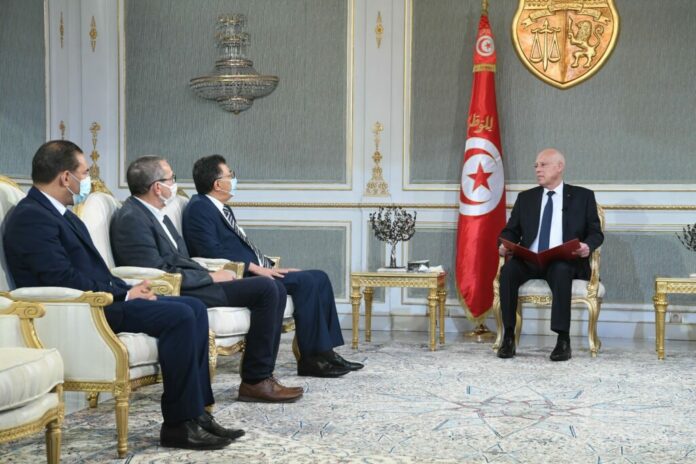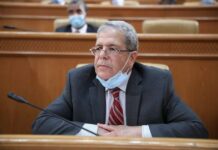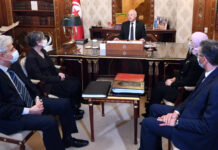President Kais Saied accused unnamed people of plotting to strike the Presidency of the Republic, noting that there are those who are plotting and others are carrying out plans to strike the Presidency.
During his meeting with Ibrahim Bouderbala, Dean of the National Lawyers Association, Bechir Abidi, Secretary General of the Tunisian League for the Defense of Human Rights and Bassam Trifi, Vice-President of the League, Kais Saied said that there were people who believed that they would succeed in tempting him with money and alliances, but they discovered that he was not “of their kind” so they started plotting.
President Kais Saied had previously accused political parties whose “reference is Islam” of trying to assassinate him, against the background of the exceptional decisions he took on the 25th of July, which led to the freezing of parliament’s work and the announcement of his assumption of executive power.
Saied pointed out that these parties “seek to strike the state and carry out assassination attempts, murder and bloodshed.”
“We are a sovereign country, we choose what we want,” Saied said, adding that “there is no choice but for the decision to be a Tunisian decision stemming from the will of the people.”
He stressed that no one will be allowed to tamper with the state or the people, and the response to any provocation will be by law, stressing that the people’s demands can only be achieved by prosecuting criminals.
In his speech to representatives of the Human Rights League and the Lawyers’ Association, he referred to crimes represented in selling official documents at the Ministry of Justice, destroying other documents and obtaining large sums of money illegally by a deputy, in addition to rampant blackmail against businessmen and attempts to pass laws in Parliament in exchange for money.
The Tunisian president confirmed that he had taken precautionary steps and imposed restrictions on some people as part of exceptional measures.
He said that he had taken these steps against some people while waiting to be brought to justice, adding that he had documents and evidence condemning them by name, but he did not mention them.
The authorities subjected several figures, including a former minister from the Ennahda Movement, representatives and state officials, to house arrest, while a number of MPs, businessmen and judges were arrested on charges related to corruption, and the security services prevented many people from traveling outside the country.
Saied had decided to extend the exceptional measures in the country until further notice, and said that he would address a statement to the people, without specifying a date, amid anticipation in the Tunisian street for his next step.
On the same day, he hinted at resorting to early elections, among other decisions that may extend to amending the system of government. He continued in his statements, “We will return to the sovereign people to decide within the framework of the law. We will not let them tamper with the law.”
The actions of Kais Saied and the movement of the Tunisian judiciary to open major corruption cases related to senior politicians and officials received wide support on the domestic scene.











